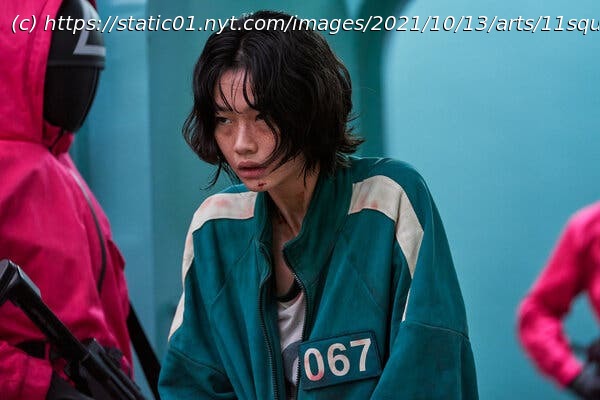Beyond the memes, Netflix’s South Korean phenomenon doesn’t show or tell you anything you don’t already know. But it sure is bloody.
This notebook contains spoilers. If you know that you’re supposed to have watched Netflix’s South Korean puzzle box “Squid Game” by now, but you’ve been lucky or prudent enough not to, here’s some of what you’re missing. There’s the eye-catching — though not especially interesting — production design and costuming, glimpses of which you may have caught on social media. Escher-like stairways and over-scaled, toy-chest décor, along with the monochromatic jumpsuits and forbidding masks, recall dystopian favorites like “The Prisoner,” “The Handmaid’s Tale” and Netflix’s own “Money Heist.” Their meme-readiness has clearly been a factor in the startling omnipresence of the series since its Sept.17 premiere. (A second season has not been announced, but betting against it would be as unwise as trusting one of the show’s desperate schemers in a game of marbles.) There’s also the element of game play, which appears to have been the primary attraction for the teenagers in my own household. The story’s hapless protagonists, sequestered on a remote island, are forced to play elaborately staged and deadly versions of childhood games, some familiar to Western viewers (tug of war, red light-green light) and some, like the squid game of the title, specific to Korea. Alliances form and shift; players reveal their true makeups; losers are immediately gunned down. The six games, spaced across nine episodes, invoke both reality-TV competitions — “Survivor” with guns — and the more purely kinetic pleasures of televised sports and e-sports. But what is “Squid Game” about? When you look past the ornament and the action, one thing you see is an utterly traditional, and thoroughly predictable, band-of-brothers and -sisters melodrama. The central group of game players is straight out of the Hollywood war-movie playbook: the strong and silent leader, the moody outsider, the violent thug, the kindly old guy and the gentle naïf who serves as audience surrogate.






